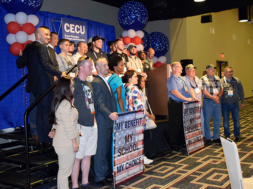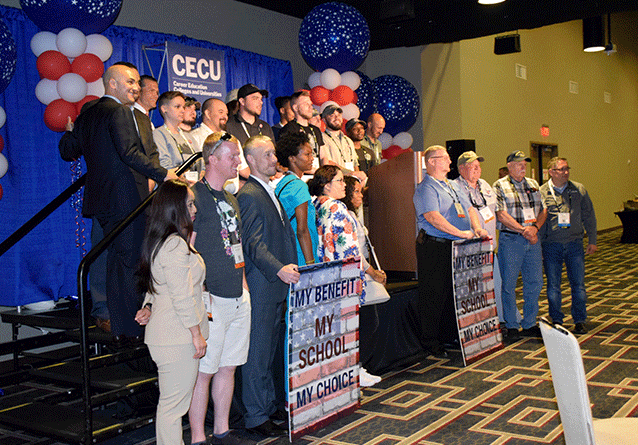
Veterans Found Group to Fight for University Choice Over Military Education Benefits
It boils down to veterans’ rights to choose which college or university best fits their career goals.
And with those rights in jeopardy, veterans founded Veterans for Career Education, or VCE, in May 2019 and adopted the following mission statement: VCE supports the right of veterans to use their earned education benefits to gain career skills at the college or institution of their choice.
VCE is supported by Career Education Colleges and Universities, or CECU.
CECU Executive Vice President and Director of Government Relations Michael Dakduk, a veteran himself who serves as VCE co-chairman, said extreme politicians want to end federal educational benefits, including the GI Bill, vocational rehabilitation and Department of Defense Military Tuition Assistance, at career universities. He was one of the speakers at a rally to protect veteran access, held during the CECU convention in New Orleans June 3-4.
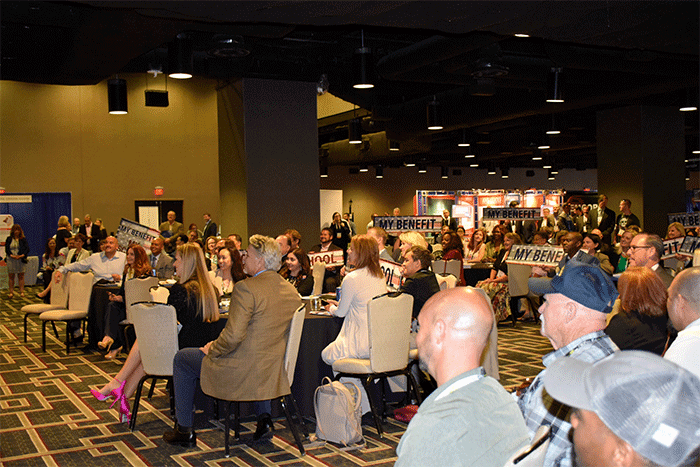
“Many of them are using veterans, and stories of veterans, as a way of peeling off supporters of our institutions,” he said. “I said why don’t we ask the veterans (who) attend these institutions that are becoming welders, electricians, construction management professionals and nurses how they feel about their institutions.”
So they gathered more than 300 stories from veterans, which they compiled into a book that can be downloaded at vets4careered.org/wp-content/uploads/2019/06/CECU_Veterans_6x9_NEW.pdf, and then delivered those stories to as many legislators as they could. They continue to deliver those books – which include success stories of military-affiliated students and alumni of postsecondary career schools, as well as the reasons those veterans chose to use their military benefits at proprietary career schools – to additional legislators.
“But we’ve taken it a step further,” Dakduk said. In May 2019, 100 veterans, military service members and family members who attend career colleges flew to Washington, D.C. to tell members of Congress that Post-9/11 GI Bill benefits and other benefits are earned and that it was each veteran’s right to choose the school that best fits his or her needs.
Veterans for Career Education at a glance
- What is Veterans for Career Education or VCE?
VCE is a campaign started by and for veterans to advocate for the right of veterans to use their earned education benefits, like the Post-9/11 GI Bill and vocational rehabilitation, at career colleges or institutions of their choice. The Post-9/11 GI benefit provides veterans with both education and living expenses while pursuing their education. The purpose of the benefit is to repay veterans for their service to the United States as they bridge their military service to a professional career of their choice. - Why did veterans start this campaign?
Some politicians and organizations are trying to restrict where veterans can use their earned education benefits. They don’t believe veterans should attend private career schools under the GI Bill. Some politicians want to classify GI benefits as an economic subsidy. - What is VCE doing?
VCE is advocating for freedom of choice and the right of veterans to attend the school that best fits their career goals by engaging elected officials, the media and influencers around the nation. - How do you join VCE?
Veterans, service members or military-affiliated family members are eligible to join VCE for free. Visit http://vets4careered.org/ to learn more and join the campaign.
In addition, some of those veterans are serving as student veteran ambassadors, doing media interviews or testifying before Congress that legislators should not be taking their benefits and choice away.
Dakduk is traveling the country and meeting with veterans on campuses to get them to join VCE and make their voices heard that veterans should have a right to decide what college to attend with their military educational benefits.
Other voices are joining in.
“If you don’t build it, you can’t fight back,” said Pete Hegseth, a Fox News contributor who is the former executive director of the political advocacy groups Vets for Freedom and Concerned Veterans for America. He also spoke at the CECU veteran rally.
“The core question at hand is does anyone have the right to choose where they use their earned benefits?” Hegsmith said. “Do you have the right to choose where you use the benefits that your government has bestowed on you? This is about choice.”
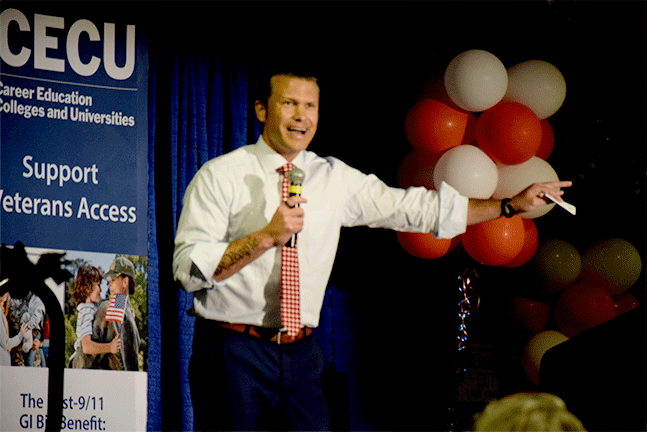
As a veteran who toured in Cuba and Iraq, Hegsmith said the government paid for him to get a master’s degree in public policy at Harvard once he completed his military service. “…Every single guy I served with at every single level should have the choice to go where they want to go to advance their career in any way they want to,” he said.
Many veterans come home ready to start their next life, and build on the skills they learned in the military. “Yet you have elites and partisans and others (who) want to condescend to them and say that’s not good enough,” Hegsmith said. “It all breaks down to this belief that veterans aren’t smart enough to choose.”
But they are, and part of this fight must include getting that message through to politicians. “I don’t want a bureaucrat or politician telling me where I (can) go to school or what is best for my life, what is best for my career, what is best for my family,” Hegsmith said.
The dollars for the GI Bill and other benefits should follow veterans wherever they want to go, Hegsmith said. But the problem is that there is a movement against career schools.
“I don’t care if you’re a Republican or a Democrat, (or) a conservative or a liberal, there shouldn’t be a concerted effort by folks in Washington, D.C. to shut down your industry that’s providing great opportunities for single, working moms, stay-at-home moms, veterans, people (who) want to start a second career,” he said. “These are the forgotten men and women that our politicians love to talk about and barely and rarely ever deliver for them.”
Hegsmith said service members must tell their story of how they used career colleges to better their lives. “The problem is those stories aren’t told far enough, wide enough and loud enough,” he said. “You just have to build it. That’s why building this organization is so critically important because it’s the beginning of fighting back.”
In fact, Veterans for Career Education has a chance to totally reverse the narrative, not just on behalf of veterans, but on behalf of the entire career college industry, Hegsmith said.
“This is a very real fight in front of us now,” Hegsmith said. “So let’s build the Army, which we’re going to do, lock shields and fight. Guess what? We’re going to win. The lives of Americans are going to be better off for it.”
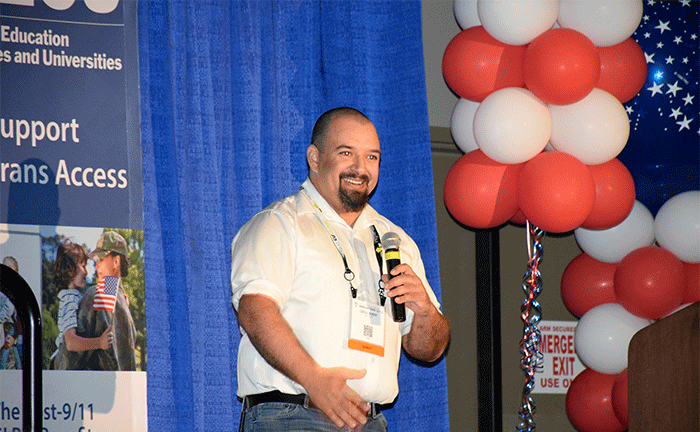
Kenneth Meija, an Army National Guard veteran and current VCE student veteran ambassador, served six years in the infantry before becoming a medic for three years.
“When I came home, I was able to work on an ambulance and pretty much give oxygen in transport and c-spines. That was about it,” he said. “I had a wife and two kids and I was searching for a way to transfer some of my military knowledge into the civilian field.
That’s when he found Unitech Training Academy, with seven campuses in Louisiana. He said it literally saved his life. Meija experienced some troubling symptoms chest pains, dizziness and shortness of breath. When he went to the VA medical facility, he was told he was too young to worry about the symptoms. During class at Unitech an instructor ran an EKG. The results showed abnormalities. Meija went back to the VA and found he had a fatal heart condition. He now was a defibrillator.
“After a month or two of being there, I went through a divorce. Three months later, I found out I had a terminal heart condition. Without going to our lab, with our EKG equipment throughout that school, I wouldn’t be standing here today,” he said at the veteran rally.
“With that being said, what we’re doing here for our veterans and our brothers and our sisters….this is not about left, this is not about right, it’s not about Republican, it’s not about Democrat,” Meija said. “We’d like you all to become a part of our organization and support us so we can fight back, so we can still have a choice for our children, for our families and our friends.”
VCE won’t be successful unless other veterans join the organization and speak out, Dakduk said.
“We’re not in this fight alone,” he said, adding that it is common for opponents of the career education sector to speak out publicly, but not for supporters to do the same.
VCE provides that voice from veterans, Dakduk said. “We need them united and we need to tell members of Congress and candidates for President that they can’t take our benefits away.”
